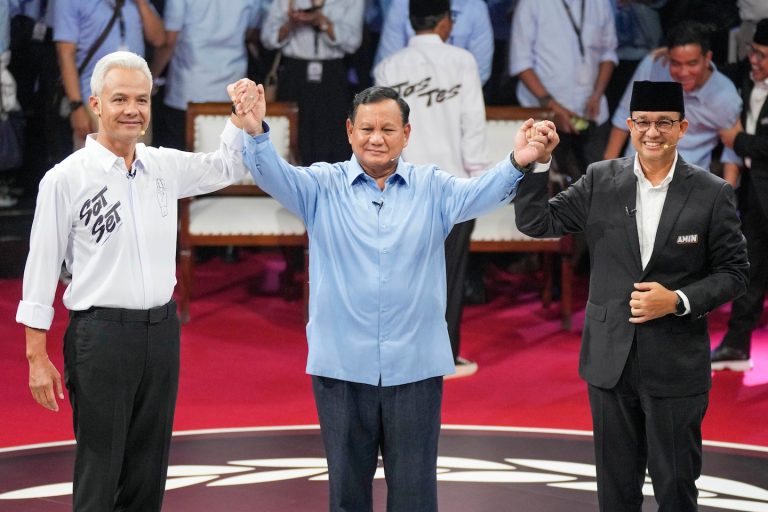Over two and a half decades, the world's most populous Muslim-majority country has consolidated its democracy after spending much of the 20th century under colonial rule and subsequent authoritarian dictatorship. The elections were mostly free and fair, and the transfer of power was peaceful and orderly. In a nation of astonishing size and diversity, the success of Indonesian democracy has been an example for other countries in the developing world – especially countless other Muslim-majority nations, where strongmen and generals have long crushed the democratic aspirations of their people.
However, in an era of global democratic stagnation, there are growing concerns about erosion and decline in Indonesia. Outgoing President Joko Widodo is completing his second term as one of the most popular elected leaders on the world stage, buoyed by years of investment in key infrastructure, public services and an expanded social safety net against the backdrop of a major economic boom. Constitutional rules dictate that Widodo cannot run for a third term, but he is pushing for continuity in the form of Defense Minister Prabowo Subianto, a former rival of Widodo and a long-time veteran of Indonesia's political scene.
“Widodo’s critics claim he lobbied the country’s Constitutional Court to change eligibility requirements for political candidates so that his son, 36-year-old Gebran Rakabuming Raka, could become Prabowo’s running mate,” my colleagues Rebecca Tan and Wenda Sharmila explained. “They also allege that Widodo was using his personal political influence as well as the power of the Executive Office to obstruct the campaign activities of other candidates. Widodo and Prabowo have denied these accusations.
Prabowo is the favorite – a situation that seemed impossible not long ago. He is a relic of an earlier era of the country's politics under Suharto's military dictatorship, during which he ordered the kidnapping of democracy activists and directed the massacre of independence fighters in East Timor, among other brutal activities, as a military commander. Prabowo's track record led to his dishonorable discharge from the military in 1998 and a visa ban on entering the United States, which was apparently dropped after he became defense minister.
Prabowo rebranded himself as a nationalist politician and ran against Widodo in the previous election, before joining the charismatic populist government after failing to defeat him in 2019. In this election campaign, he reinforced the image of the soft-spoken grandfather who performs cheeky dances. Social media platforms like TikTok are used by a wide swath of large Indonesian voters. More than 50% of Indonesian voters are under 40 and have limited memories of the country's pre-democratic era.
Widodo came to power as a reformist outsider with a working-class background, stripped of the privileges and lineage afforded to figures like Prabowo by the country's ruling political elites. But he presided over a scenario that saw his son-in-law, as a senior judge, pass a court ruling enabling his son to contest these elections as Prabowo's running mate. Prabowo, who is running against former Central Java governor Jangar Pranowo and former Jakarta governor Anies Baswedan, may not only be expanding Widodo's legacy but also building his own dynasty.
Analysts warn of deeper blows to democracy in Indonesia under Widodo's rule. “He weakened the country's independent anti-corruption commission, signed a sweeping reform of the criminal code that restricted freedom of expression, criminalized sexual relations outside of marriage, and gave the government broad, undefined powers to prosecute critics and opponents,” New Delhi's Gordon LaForge noted. America is a think tank. “He distributed patronage, was criticized for interfering in the internal affairs of rival political parties and allowed the military to play a greater role in civilian life.”
“What we are seeing are very brazen attacks on democratic norms and institutions,” Made Supriyatma, a visiting fellow at the Singapore-based Yusuf Ishak Institute ISEAS, told my colleagues.
The stakes facing any Indonesian election are high, given the country's importance on the world stage. It is a supplier of many important resources of the digital age, including nickel. It is also a rising Asian power that stands in the face of the heated 21st century rivalry between the United States and China.
On that front, Widodo charted a complex middle course. Joshua Kurlantzik of the Council on Foreign Relations wrote that he “has worked aggressively to boost Chinese aid and investment, perhaps more than any other leader of a major Southeast Asian economy.” “But at the same time, he and his military advisers have become more concerned in recent years about China’s activities in Indonesian territorial waters, so he has also expanded defense cooperation with the United States.”
What comes next will have major implications regardless of the election outcome. “Indonesia, a huge, multi-ethnic country whose borders were arbitrarily drawn by Dutch colonialism, offers a broad canvas onto which many different hopes and fears can be projected,” Ben Bland, author of a book about the outgoing president, wrote in Foreign Affairs. “Its political developments are seen as a sign of democratic consolidation, a harbinger of the decline of global democracy, a beacon of tolerance or economic development, or an example of the dangers posed by growing Islamic extremism or protectionism.”
He concluded: “It may not resemble the Western vision of liberal democracy, but the battles to shape the future of its political system will not end after the elections.”

